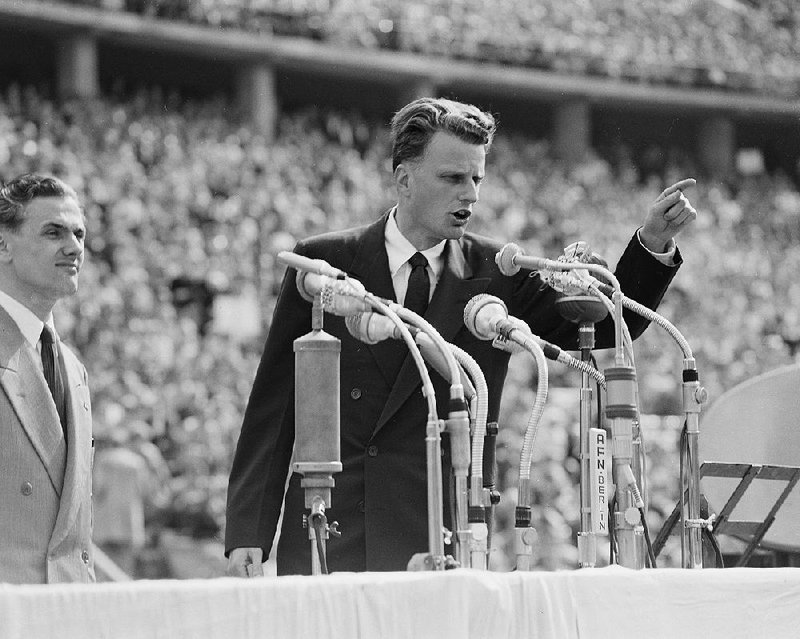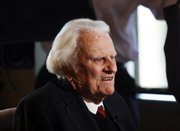The Rev. Billy Graham, a North Carolina farmer's son who preached to millions in stadium events he called crusades, becoming a pastor to presidents and the nation's best-known Christian evangelist for more than 60 years, died Wednesday at his home in Montreat, N.C. He was 99.
His death was confirmed by Jeremy Blume, a spokesman for the Billy Graham Evangelistic Association.
Graham had dealt with a number of illnesses in his final years, including prostate cancer, hydrocephalus -- a buildup of fluid in the brain -- and symptoms of Parkinson's disease.
Tributes to Graham poured in from current and former U.S. leaders, with President Donald Trump tweeting: "The GREAT Billy Graham is dead. There was nobody like him! He will be missed by Christians and all religions. A very special man." Former President Barack Obama said Graham "gave hope and guidance to generations of Americans."
Click here for larger versions
Photos by The Associated Press
Photos by The Associated Press
A tall man with thick, swept-back hair, blue eyes and a firm jaw, Graham was a commanding presence in the pulpit, with a powerful baritone voice.
Graham reached multitudes around the globe through public appearances and his pioneering use of prime-time telecasts, network radio, daily newspaper columns, evangelistic films and satellite TV hookups.
A central achievement was his encouraging of evangelical Protestants to regain the social influence they had once wielded, reversing a retreat from public life that had begun when their efforts to challenge evolution theory were defeated in the Scopes trial in 1925.
But in his later years, Graham kept his distance from the evangelical political movement he had helped engender, refusing to endorse candidates and avoiding the volatile issues dear to religious conservatives.
"If I get on these other subjects, it divides the audience on an issue that is not the issue I'm promoting," he said in an interview at his home in North Carolina in 2005 while preparing for his last U.S. crusade, in New York City. "I'm just promoting the Gospel."
Graham took the role of evangelist to a new level, lifting it from the sawdust floors of canvas tents in small-town America to the podiums of packed stadiums in the world's major cities. During his "global crusade" conducted from Puerto Rico in 1995, his sermons were translated simultaneously into 48 languages and transmitted to 185 countries by satellite.
At times, he seemed to fill the role of national clergyman. He read from Scripture at President Richard Nixon's funeral in California in 1994, offered prayers at a service in the National Cathedral for victims of the Sept. 11, 2001, terrorist attacks and, despite his failing health, traveled to New Orleans in 2006 to preach to survivors of Hurricane Katrina. He also wrote about 30 books.
Graham's standing as a religious leader was unusual: Unlike the pope or the Dalai Lama, he spoke for neither a particular church -- though he was a Southern Baptist -- nor a particular people. His reach was global, and he was welcomed even by repressive leaders such as Kim Il Sung of North Korea, who invited him to preach in Pyongyang's officially sanctioned churches.
[PREVIOUS COVERAGE: Read about Graham's visits to Arkansas]
On Wednesday, Graham's body was moved from his home in Montreat to Asheville, where a funeral home is handling the arrangements.
Mark DeMoss, a spokesman for Graham, said Graham's body will be taken from Asheville to Charlotte at 11 a.m. Saturday. The procession is expected to take 3½ hours, ending at the Billy Graham Library.
DeMoss said Graham will lie in repose Monday and Tuesday, and a private funeral will be held Friday, March 2. He said invitations will be extended to Trump and former presidents.
HE HAD HIS CRITICS
Graham was not without critics. Early in his career, some mainline Protestant leaders and theologians accused him of preaching a simplistic message of personal salvation that ignored the complexities of societal problems such as racial prejudice and poverty.
Later, critics said he had shown political naivete in maintaining a close public association with Nixon long after Nixon had been implicated in the cover-up of the Watergate break-in.
Graham's image was tainted in 2002 with the release of audiotapes that Nixon had secretly recorded in the White House three decades earlier. The two men were heard agreeing that liberal Jews controlled the media and were responsible for pornography.
"A lot of the Jews are great friends of mine," Graham said at one point on the tapes. "They swarm around me and are friendly to me because they know that I'm friendly with Israel. But they don't know how I really feel about what they are doing to this country."
Graham issued a written apology and met with Jewish leaders. In the interview in 2005, he said of the conversation with Nixon: "I didn't remember it, I still don't remember it, but it was there. I guess I was sort of caught up in the conversation somehow."
Early in his career, Graham broke with the traditional conservatism of his Southern fundamentalist origins over the issue of race. Even in the Jim Crow era, he reached across racial lines and sought integrated audiences for his crusades.
Nonetheless, Graham was not a vocal supporter of the civil-rights movement of the 1960s. He opposed racial segregation, he said, but he declined to attend the 1963 March on Washington for Jobs and Freedom. At other times, he criticized "some extreme Negro leaders [of] going too far and too fast."
In a 2005 interview with The Associated Press, Graham said he regretted that he didn't battle for civil rights more forcefully.
"I think I made a mistake when I didn't go to Selma" with many clergy who joined the Alabama march led by King. "I would like to have done more."
During the 2012 White House campaign, with Graham mostly confined to his North Carolina home, he all but endorsed Republican Mitt Romney. And the evangelist's ministry took out full-page ads in support of a ballot measure that would ban gay marriage.
Some critics on social media faulted Graham for that stance Wednesday, saying his position had harmed gay rights.
In the past few decades, a new generation of evangelists, including Graham's elder son, Franklin Graham, began developing their own followings. In November 1995, on his 77th birthday, Graham named Franklin to succeed him as head of the Billy Graham Evangelistic Association. His daughter Anne Graham Lotz and his grandsons Will Graham and William Graham Tullian Tchividjian are also in ministry.
In a tweet, Houston-based televangelist Joel Osteen wrote: "Billy Graham has always been and will always be a hero in our home. Next to my own father, Reverend Graham was the most humble and gracious man I ever knew. I am honored to call him a friend and a mentor."
Graham was by no means unique in U.S. history as a popular evangelist. George Whitefield in the mid-18th century, Charles Finney and Dwight Moody in the 19th century, and Billy Sunday at the turn of the 20th were all capable of drawing vast crowds.
But none of them combined the ambition, the talent for organization and the reach of Graham, who had the advantages of jet travel and electronic media to convey his message. In 2007, the Billy Graham Evangelistic Association estimated that he had preached the Gospel to more than 215 million people in more than 185 countries and territories since beginning his crusades October 1947 in Grand Rapids, Mich. He reached hundreds of millions more on television, through video and in film.
"This is not mass evangelism," Graham liked to say, "but personal evangelism on a mass scale."
The Grahams lived on a 200-acre mountain retreat in Montreat. His wife, Ruth Bell Graham, died in 2007. He is survived by his sons, the Rev. William Franklin III and the Rev. Nelson Graham, known as Ned; three daughters, Virginia Tchividjian, known as Gigi, Ruth Graham McIntyre and Lotz; and numerous grandchildren and great-grandchildren.
PRESIDENTIAL RELATIONS
Recognizing his influence, presidents made a point of seeking friendly relations with Graham; Lyndon B. Johnson did so assiduously. Graham was a frequent guest of Ronald Reagan, and in January 1991, George H.W. Bush invited him to spend the night at the White House the day before U.S.-led forces began bombing Iraq in the Persian Gulf War. Former President Bill Clinton asked Graham to offer prayers at his inauguration in 1993.
President George W. Bush said that it was after a walk with Graham at the Bush family's compound in Kennebunkport, Maine, that Bush, as a younger man, decided to become more serious about his faith and quit drinking. Obama visited Graham at his North Carolina home in 2010.
Former President Jimmy Carter released a statement Wednesday saying that he had counted Graham among his advisers and friends, adding that the minister had "had an enormous influence on my own spiritual life."
Of the presidents, Graham was most closely associated with Nixon. The two had met in the early 1950s, when Nixon was a senator from California. As vice president, Nixon addressed a capacity crowd at Yankee Stadium for the closing meeting of Graham's New York crusade in 1957.
Graham endorsed Nixon in the 1968 presidential race and allowed that endorsement to be used in television commercials. He gave the invocation at Nixon's 1969 inauguration and came to be described as Nixon's unofficial White House chaplain.
Graham said he had been "innocently unaware" of the storm gathering over Watergate. But when the extent of the scandal became known -- disclosures of the break-in and the subsequent cover-up orchestrated by the White House -- Graham tended to look the other way, his critics said.
In 1982, Graham displeased the Reagan administration when, after a visit to the Soviet Union, he spoke in favor of universal nuclear disarmament. He also visited Russian churches, and his comment that he had seen no evidence of religious repression by the Soviet authorities created a furor among conservative church members in the United States.
It was during this period, in his sixth decade as an evangelist, that Graham and his organization experimented with new technologies. In 1986, in Paris, he used direct satellite transmissions to carry his sermons to about 30 other French cities. With his crusade in San Juan, Puerto Rico, in 1995, he expanded his satellite reach more than sixfold.
The Billy Graham Evangelistic Association continues to organize crusades. It also produced Graham's Hour of Decision global radio program and prime-time television specials, trains thousands of evangelists and missionaries, and publishes Decision magazine. A rapid-response team deploys chaplains to disaster areas.
Information for this article was contributed by Laurie Goodstein of The New York Times; by Bart Barnes and Sarah Pulliam Bailey of The Washington Post; and by Rachel Zoll, Jonathan Drew, Richard N. Ostling and by other staff members of The Associated Press.
RELATED ARTICLE
http://www.arkansas…">Arkansans recall Graham
A Section on 02/22/2018



